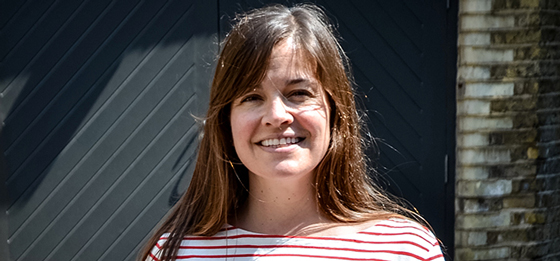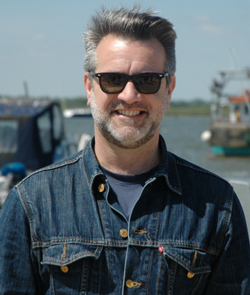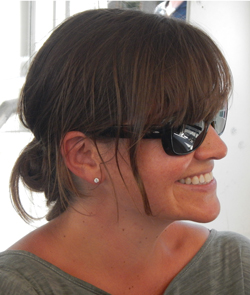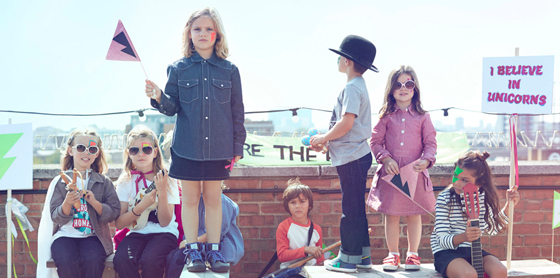
Sarah Cooper (BA’96): The Ethical Outfitter
By Mark Campbell
When Sarah Cooper (BA’96) began shopping for clothes for her Essex-based family, she was appalled at what she found. All across Britain, shops were filled with children’s apparel that was covered in brands or made from cheap, possibly toxic materials. But it was the realization that these items were likely being manufactured by children not much older than her own that truly troubled her.
“We go to such great lengths to ensure that our kids have these lovely childhoods and don’t grow up too quickly,” Cooper explains. “And you think of some poor child having to work to support their family, or because they have no family. It’s horrifying.”
Unable to find any organically and ethically produced children’s clothing she liked – and knowing other parents shared her dilemma – Cooper and her husband decided to launch their own line in 2013. Working with a designer, they developed clothing that is durable, safe, easy to care for, attractive and sustainable. They called this bold new venture The Fableists.
“The name comes from ‘Fable,’ because we tell the whole story of our clothes – and it’s a moral tale,” says Cooper. “And it comes from ‘Activist’ because we are making changes for the better.”
The Canadian way
Making change for the better has long been part of Cooper’s nature. Growing up in Ottawa, she recalls peeling potatoes at soup kitchens with her mother on holidays, volunteering as a Special Olympics swim coach, and participating in every fundraising ‘thon’ you can name.
“My husband, who’s British, says that’s the Canadian way,” she laughs. “I mean, every Canadian knows when the Terry Fox Run is and has participated at some point, right? It’s just part of the culture.”kitchens with her mother on holidays, volunteering as a Special Olympics swim coach, and participating in every fundraising ‘thon’ you can name.
 Cooper found a similar culture at Dalhousie University, one that encouraged her to explore the world and see how she could make a difference on a broad scale.
Cooper found a similar culture at Dalhousie University, one that encouraged her to explore the world and see how she could make a difference on a broad scale.
“I went to Moscow in 1995 with the Russian Studies department. We were quite immersed in the culture while we were there and had a lot of free time to explore, meet people and, with Russian student cards, we travelled like Russians. This inspired my interest in travel and exploring other cultures, which has continued to this day and led us to making our clothes in India.”
She was also influenced by friends studying International Development and Women’s Studies at the university, noting that their courses and readings were a source of constant conversation and debate. “I had no idea that was an actual course you could study at university until then. Students who came to Dalhousie with an idea of ‘making a difference’ in the world could actually study and earn a degree in an area which was their passion and interest. That makes a difference from the course choices of previous generations.”
An ethical alternative
Inspired by that experience, Cooper and her husband, who both work in advertising, created an ethical clothing company, starting with the fabrics they source – all 100% certified organic.

“We are sold this idea that cotton is so natural, but the growth, processing and manufacture of standard cotton uses up to 8,000 chemicals,” explains Cooper. “Three of the most hazardous insecticides as described by WHO are amongst the ten that are most commonly used in cotton farming. These poisons are harming whole communities where cotton is grown. They also stay in the clothes. No wonder there is an increase in children with eczema, not to mention asthma and other respiratory problems from inhaling the chemicals in cotton clothing.”
Cooper adds that the factory in India that manufactures their clothing has implemented education and support programs for employees. Those employees are also paid wages above the cost of living, and the factory offers bonuses and fair overtime practices. That’s particularly important to her: traditionally, farmers in India have not been well compensated for their cotton crops, leading to immense debt that has, in many cases, resulted in suicides.
“We’re working with the Chetna Collective of organic farmers. They represent about 15,000 marginal or small-hold farmers and have converted all these farms to organic. They educate about the use of chemicals. And they negotiate a fair price for cotton.”
Committed to sustainability
Organic materials, ethical business practices – these are admirable qualities for a line of children’s clothing. So too is the company’s commitment to sustainability. The classic design and durability of each item means it can be handed down from generation to generation and it will still look good, regardless of gender or current trends. And every item is fully recyclable.
“When families are done with an item, they can return it for a coupon toward a future purchase,” says Cooper. “We don’t want our clothes to end up in the ground somewhere. If they are still wearable, we can find someone to wear them. If not, we have a supplier who runs a salvage range of cotton/poly mixed sweatshirts that will use them. The fact that our garments are organic makes them much more desirable for recycling.”
Having successfully launched their clothing line, Cooper and her husband look forward to a day where all farmers in India are gainfully and safely employed. But they also hope The Fableists encourages parents to choose items made with care and respect, while inspiring kids to be kids. They’re not just selling clothes Cooper says; they’re selling a lifestyle.
